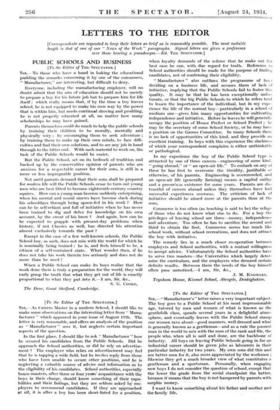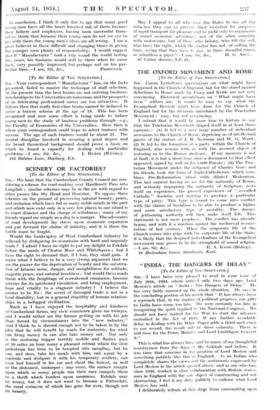[To the Editor of THE SPECTATOR.] SIR,—" Manufacturer's" letter raises
a very important subject. The boy goes to a Public School at his most impressionable age, tutored by men and women of what is known as the gentlefolk class, spends several years in a delightful atmo- sphere, and eventually leaves with the Public School stamp our women rave about—good manners, well dressed and what is generally known as a gentleman—and as a rule the poorest man in the world to mix with the men of the rank and file, the people who, when all is said and done, are the backbone of industry. All boys on leaving Public Schools going in for an industrial career should be given jobs as labourers in their particular industry for two years. My own sons did this and are better men for it, also more appreciated by the workmen ; likewise they get a much broader view of what constitutes a gentleman and a sportsman. Personally, when engaging new boys I do not consider the question of school, except that the lower the grade from the social standpoint the better, because iemeans that the boy is not hampered by parents with surPlas stoney. • I want to know something about hislather and mother and the family life.
In conclusion, I think it only fair to say that many good young men have all the heart knocked out of them because their fathers and employers, having been successful them- selves, think that because their young men do not see eye to eye with them the young men's ideas are all wrong. I am a great believer in these difficult and changing times in giving the younger men plenty of responsibility. I would suggest that if " Manufacturer " took a trip round the world lasting two years, his business would still be there when he came back, very possibly improved, but perhaps not on his par-



































 Previous page
Previous page